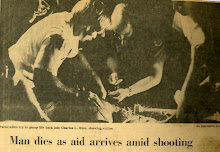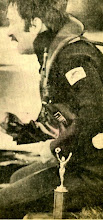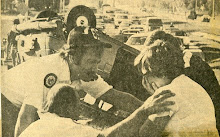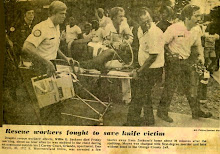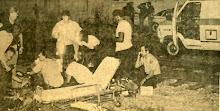In the early days we never worried about blood bore pathogens. The rule was he who had the most blood on them won. Because he had been in there the deepest, getting it done, not standing back. No one wore gloves or any other type of protection. The doctors and nurses in the emergency rooms did not wear gloves, except when they did a specific type of procedure that called for a very sterile technique. In training they never taught us about hepatitis B or any other blood born diseases. We were the second class of paramedics in our county and this was back in the 70’s and I think they simply forgot or did not have the time to squeeze it into our training.
When AIDS first began to be reported we still did not change our procedures. It was not until they understood how it was transmitted that things began to change. Suddenly we had to wear gloves for every patient. The doctors and the nurses in the ER were wearing protective gear. It was still a distant threat. Something that happened in the big cities, not in little Orlando.
About this time is when we began to see the first AIDS patients. They were suffering terribly. With no real treatment regiments developed, the best they could do was treat the symptoms. They were emaciated skeletons slowly dying. It was an awful way to die. It scared us all to think we could catch it from our patients. But the chances were slim. So we took precautions and continued to treat our patients.
I remember it well. It was Christmas day. I was working out of Station 7. We had a call for a seizure. No big deal. We arrived to find a male who was unconscious after a seizure. He had no previous history of seizures. We were unable to rouse him, so according to our standing orders we were to use the protocol for an unconscious patient with no obvious medical reason for their state. This meant starting an IV and administering some drugs. Something I had done a thousand times.
My partner had taken a vacation day to be with his family. So I was riding with another medic. We had not worked together much. We both knew that the IV and other procedures were probably not needed, but we had to go through the protocol. He was finding other things to do. So I set up and started the line. When I held out my hand for the tubing from the IV bag my partner was talking to someone and not paying attention to what I was doing. The cap was still on the tubing. He should have been handing it to me with cap off so I could hook it to the catheter.
Instead I grabbed it out of his hand and took the cap off with my mouth. Something I had done hundreds of times before AIDS. When I took the cap off I tasted blood. I knew that I had just ingested some of the patients blood from my gloves. That is really a very minor exposure. Something that could be argued was not an exposure at all. But I had burnt the roof of my mouth the night before eating something. I had actually blistered it and it was raw and sore. It was a perfect way for AIDS to enter my blood stream. If this guy had AIDS.
You know how in the movies the camera will suddenly zoom rapidly on into a close of someone's face to emphasize the moment. That is exactly how I felt. I felt as if I suddenly had to face a new and much more scary threat. I had come to terms with the risks at fires, scenes of violence, accident with injuries but suddenly I was confronted with something I had not prepared myself for. The possibility of dying the way I had seen those AIDS patients die.
I finished the shift and tried to forget what had happened. It was such a long shot that I should not even worry about it. I mean just because I tasted blood off my gloves. But I became obsessive about it. The patient had the type of history that could indicate AIDS. He had just gotten out of jail and it was reasonable to suspect he was a drug user. Both of those facts could lead to AIDS. I wanted to ask that he be tested so I could know if there even was a threat, but in the early days of AIDS we could not request the hospital to test the patient for AIDS. The laws had not been changed. So I had no real way of knowing if this patient was an exposure or not. Finally after a couple weeks of letting this fear get in the way of my professional and personal life. I made an appointment to see my doctor.
At the time my personal doctor was also the EMS Director for the county, he was intimately familiar with the job and AIDS. So I went to his thinking he was going to tell me not to worry about such a minor incident. I was letting my imagination run wild. I went to his office looking forward to having this monkey off my back. Then he said.
“I think it is best if we go ahead and test you.”
“What?”
“Yeah, we are going to test you now as a base line. Then in seven months you will come back and we will test you again. By then it will show up in the tests.”
“But..”
“If I were you I would not have sex with my wife until we determine if you do have AIDS.”
I almost feel off the exam table. This appointment was supposed to make me rid me of my anxiety not up the ante through the roof. They drew my blood and sent me home. A week or so later they called to let me know I was free of AIDS now, but now I had to wait for seven months then return to be tested again. Then we would know. Back then there were no rapid tests and what constituted a real exposure was still being identified. So see you in seven months.
I did not handle this well. This was not what I had signed up for. I understood the dangers at a fire. Give me a good clean flashover or building collapse to this. This is not how I wanted to die. And it was all because I wanted to save the world . I wanted to become a paramedic. To help people. Now those same people could kill me in the most awful way imaginable. This was not fair. It was coloring my professional and personal life. There were almost daily stories of doctors or nurses quitting their professions because of their fear of exposure. I was not sure if they weren't the smart ones. Remember very little was know about the disease or its transmission at this point.
Naturally I tried to put up a front at work. I continued to go on runs and treat my patients. I tried to shove it into the background but it would not go. I began to resent the people I was supposed to help. I started to see them as a threat no matter what their age or condition. It was going to be a long sevens months in a lot of ways.
We all talked it about it at the stations as more and more stories came out in the press. There was a lot of hype and wild stories. While the county and city provided us with training, what was known about AIDS and how easily or difficult it was to transmit was still not well understood. There were stories of nurses contracting it from a single contaminated needle stick. That was less than what I had ingested. I was beginning to question why I was a paramedic. After all of the ups and downs, after coming to understand and accept my role in a patients care, I began to wonder if it were worth it.
We got a call for a woman struck by a car. It was near the large Baptist church near a very busy highway. When arrived we found an elderly black woman lying in the street. A car at angle nearby, skid marks marking where the driver had slammed on the brakes. I put on my gloves and grabbed the equipment. I was the first one to her. She was dressed up in a black dress with matching hat and veil. She wore black gloves. I remember thinking how sad it was to see her in her best church going clothes lying broken in the street. I knelt next to her. She reached up and took my hand. Fear etched her face. I looked down and said.
“It’s OK. We here now. We going to take good care of you.”
Squeezed my hand and some of the fear left her face.
“I will be right back. I have to get some more equipment from the truck.”
I stood up and was trotting back to the truck when I felt as if a weight had been lifted off my shoulders. When I said it would be OK we were here now and saw the look on her face something I had lost was found. Why I had come on the fire department and became paramedic came back to me in a rush. I had done it for her and all of those like her. She and those like her was the reason that I did the job. The AIDS exposure was just one more price that had to be paid. You take your ticket and you take your chance. It was part of the job now. Just like a flashover or building collapse. If I did not like it then I needed to get out and do another job. But being able to say those words to someone like her was worth the risks. It was worth it all.
I grabbed the equipment and ran back to the woman. We treated her and transported her to the hospital. Seven long months later I went to the doctors office and had my blood drawn. It took me a week to get up the courage to call and get the answer. I was clear. I never again let the threat of AIDS or any other communicable disease take away the satisfactions that the job provided. That is not to say I never worried about it or took precautions, because I did. But the fear never again drove me. I was able to drive that fear.

